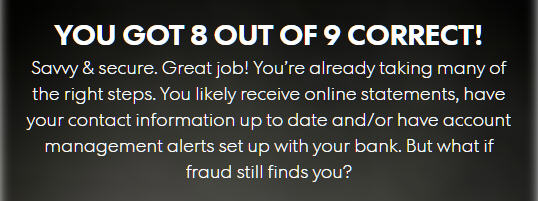This post brought to you by Chase. The content and opinions expressed below are that of The Finance Buff.
At work, we have some visitors from another country. While chatting with them at lunch, I heard they were very careful with using their bank cards online and in stores, because the laws in their country offer no protection against fraudulent transactions. If someone steals their card information and makes a purchase, they have to spot it right away and notify their bank. If the bank is able to stop the money from leaving the bank, they are lucky; if not, too bad.
Here in the United States we live in quite a different world. The laws are much friendlier to the consumers. Our banks also offer great fraud protection policies, procedures, and tools.
For instance on my account with Chase, Chase offers zero-liability protection, meaning that I won’t be liable for fraudulent transactions in my account if I notify them promptly. All transactions are put through 24/7 fraud monitoring. If the system sees something suspicious, Chase double-checks with me by phone, text message, or email. My Chase credit card now has the EMV chip technology. When I use my credit card at stores that accept chip cards, they know for sure a genuine card is being used.
Some might say the consumer-friendly laws and our banks’ proactive fraud protection and monitoring make us too complacent. We as consumers should still play an active role in protecting ourselves against fraud. Ultimately the fraud costs to the banks are borne by all customers collectively. It’s much better if fraud can be prevented in the first place.
To take advantage of the zero-liability protection, we should check the transactions in our account, at least once a month when we get the account statement. Signing up for online paperless statements not only helps the environment but also makes sure the account statements won’t get lost in the mail.
If the 24/7 fraud monitoring catches something suspicious, the bank will contact us to confirm whether it’s fraudulent or just a false positive. If your credit card is lost, stolen, or if there has been fraud detected on your account, Chase will ship you new card immediately. If you’re traveling and away from home, Chase will work with you to help authorize the credit card purchases you need. For that to happen, they must have our most current email or phone number. Therefore, whenever your phone number changes make a habit to update your contact information on your accounts right away. That way you won’t forget.
I took a “What’s My Fraud IQ?” Quiz on USA Today. Although I thought I knew well how to protect my accounts against fraud, I got only 8 out of 9 questions right.

I got tripped up by the question on online shopping at a coffee shop using public Wi-Fi. I thought I would be safe as long as I enter my card information on a secure site, which almost all shopping sites have. Try the quiz and see how many questions you can answer correctly!
After taking the quiz, I reviewed security alerts on my Chase account. I’m getting notified for transactions above a certain amount, transactions when a card is used over the phone, by mail, or online, international transactions, and transactions at gas stations.

If I get an alert and I made the transaction myself, it takes only a second to delete the alert. If someone else is using my card information online or in another country, I would know right away.
Check this web page from Chase for more features and tips on how to proactively protect your account against fraud.
Say No To Management Fees
If you are paying an advisor a percentage of your assets, you are paying 5-10x too much. Learn how to find an independent advisor, pay for advice, and only the advice.